Workers of the world, Unite! Sassquach talks to Nato Green.
 Thursday, July 12, 2012 at 7:16AM
Thursday, July 12, 2012 at 7:16AM
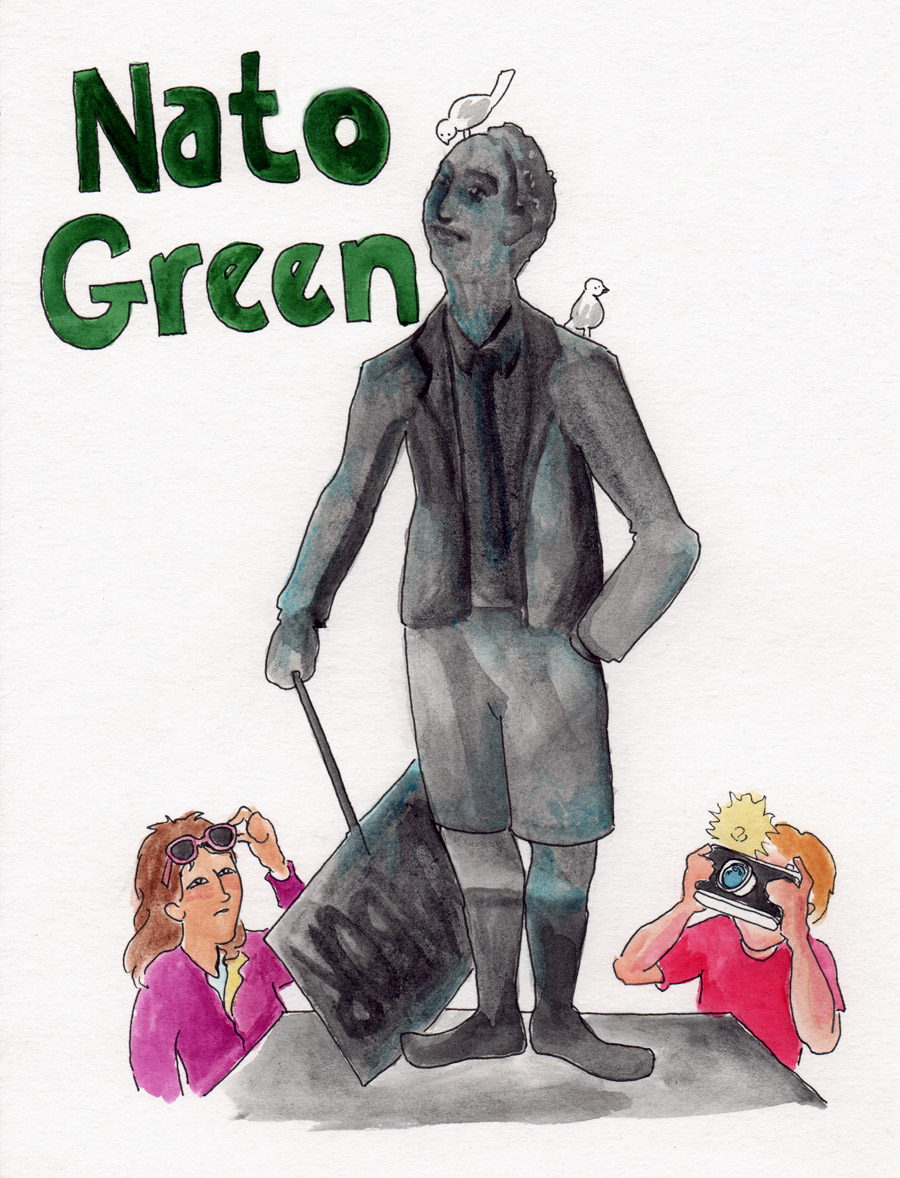
Nato Green has been at the comedy grindstone for seven years now and his moment has come. He's got a brand new comedy album out with Rooftop Comedy, he's begun writing on the new FX show Totally Biased, and I'm betting it's a matter of months before we start seeing him on the 24-hour news networks. He's sharper than a Ginsu knife and an absorbing person to talk to. Take a look-see at our conversation below.
...
Sassquach: I just saw pictures of the Jezebel party. Was that the first party you’ve been to out in NY or one of many?
Nato: That was actually the second party we went to that night. You know, we’re showbiz now. Before [we went to the Jezebel party], we had gone to a premiere party for some new documentary that’s airing on HBO. We were up on the top floor of HBO for this fancy reception and…I don’t know if you know this about me, but I never learned basic social graces. Kamau is usually the angel on my shoulder. At some point we were in our car service going between parties and I said to Kamau, if I could learn some of his charm…his accessibility, his likeability and if he could acquire some of my assholery, we would get a lot more done. He was like, “That’s why we’re a team.”
We got to the HBO party and got in the elevator and I’m standing in the elevator with my arms crossed. It just didn’t occur to me to uncross my arms. Kamau had to say, “Nato. We’re about to go into a room full of important people who we want to like us. Uncross your arms. You don’t need to come off the elevator looking like you’re sitting in judgment.”
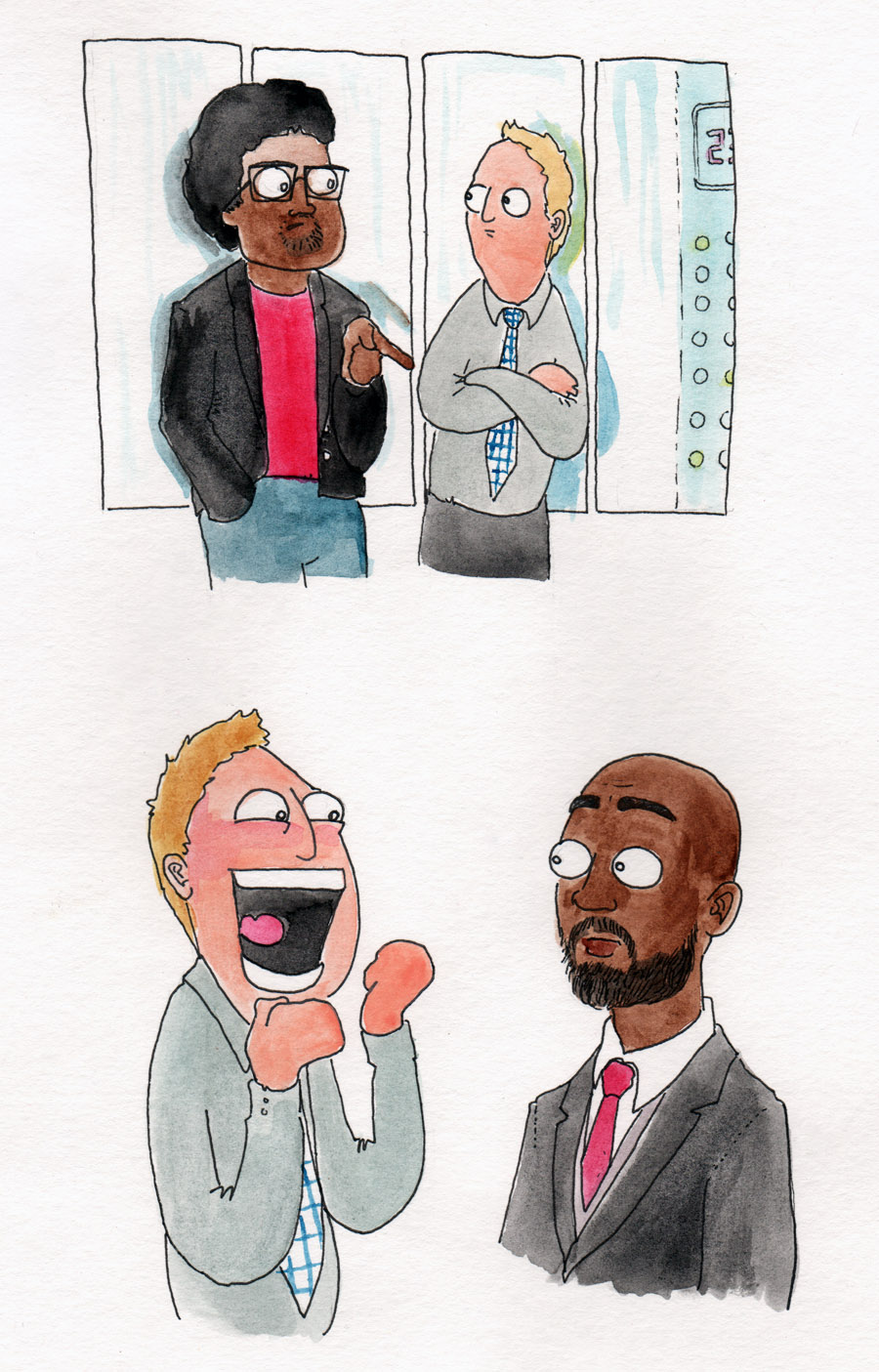
The highlight of the HBO party…we met Freeway Ricky Ross. Do you know who that is? This has a very specific generational and racial design. Many people remember the whole news story about the dark alliance between the CIA and the Nicaraguan Contras. Freeway Ricky Ross was the drug dealer in LA who was the conduit of that. He just got out of jail and they’re making a documentary about him. Now we have his cell phone number.
Sassquach: Is he going to appear on the show at some point?
Nato: I don’t see how he can not…we need to figure out a reason or some context for it. I’ve been thinking about it…we need something funny he can do but then there aren’t many people who are seminal figures in the history of drugs. It seems like a missed opportunity not to let him be him and talk about what he’s actually known for.
Last week the New York Times did this big article about the Mexican drug cartel. When the Dark Alliance originally broke in ’96 in the San Jose Mercury News, I was in college, so I really followed it. Because it became such a shit-storm, I read lots of books about it and watched documentaries that it had inspired. I was so fascinated by that relationship between drugs and US national security policy. When I posted the article on facebook, there was a big exchange on my thread that prompted me to quote the lyric by The Coup, where Boots Riley says, “Back before Freeway Ricky Ross put crack in the sack.” So when the people at the HBO party said, “Do you know Freeway Ricky Ross is here?” I said, “Oh my gawd, I was just talking about him on facebook!” Which is a weird thing to say…so they said, “Well, we’ll go get him and you can tell him.”
Later I posted on facebook, “Hey, we just met Freeway Ricky Ross,” and Boots Riley responded, “Dope.” It comes full circle.
Sassquach: Telling a historic drug dealer that you’ve been talking about him on facebook seems surreal.
Nato: It was the kind of thing where he said, “Oh really? Why?” I had to explain that there’s a band called the Coup and there’s a line that says ‘Ricky Ross put crack in the sack,’ and I was in the middle of the sentence when the thought crossed my mind. “Is this like reminding someone about their abortion?”
Lack of social graces. I should’ve known not to mention that he put crack in the sack.
Sassquach: Did his reaction imply that he was offended?
Nato: Let put it this way. I have had much harsher reactions from yuppies in casual conversation about lesser things than reminding Ricky Ross of his history of drug trafficking. I feel like he handled it with a fair amount of equanimity. He’s probably past the point of caring. People know him for drugs. I can’t imagine him getting to a situation and going, like, “How dare you not be familiar with my other works? I am so much more than just a drug dealer.”
Sassquach: So, big fancy parties, a job on a new TV show, and a comedy album...big summer. Is this your first comedy album?
Nato: First one. I’ve been doing comedy for 7 years. Not 7 years full time, but not only dabbling. When I was in college I did some dabbling but I don’t count that. I did some dabbling because one of my best friends in college was the son of the assistant manager at the Comedy Underground in Seattle. As a goof for his 21st birthday, we decided to have the party at the Comedy Underground and do sets. I did a few more sets at the Comedy Underground, but it was horrible. I’m ashamed of everything that happened in that period.
It was horrendous. It was worse than that. I didn’t have the confidence or the craft or the perspective to do anything, so I copped out and did meta-comedy. Making fun of the field of comedy…but badly.
So we’re doing the show in Seattle and because he’s the son of the manager of the club, all the comics working comics in Seattle have known him since he was a baby. They all came out and did sets too. I made fun of comics who do Jack Nicholson impressions...but then there was a guy there, a working comic, whose career was based on doing Jack Nicholson impressions. It was such a train wreck.
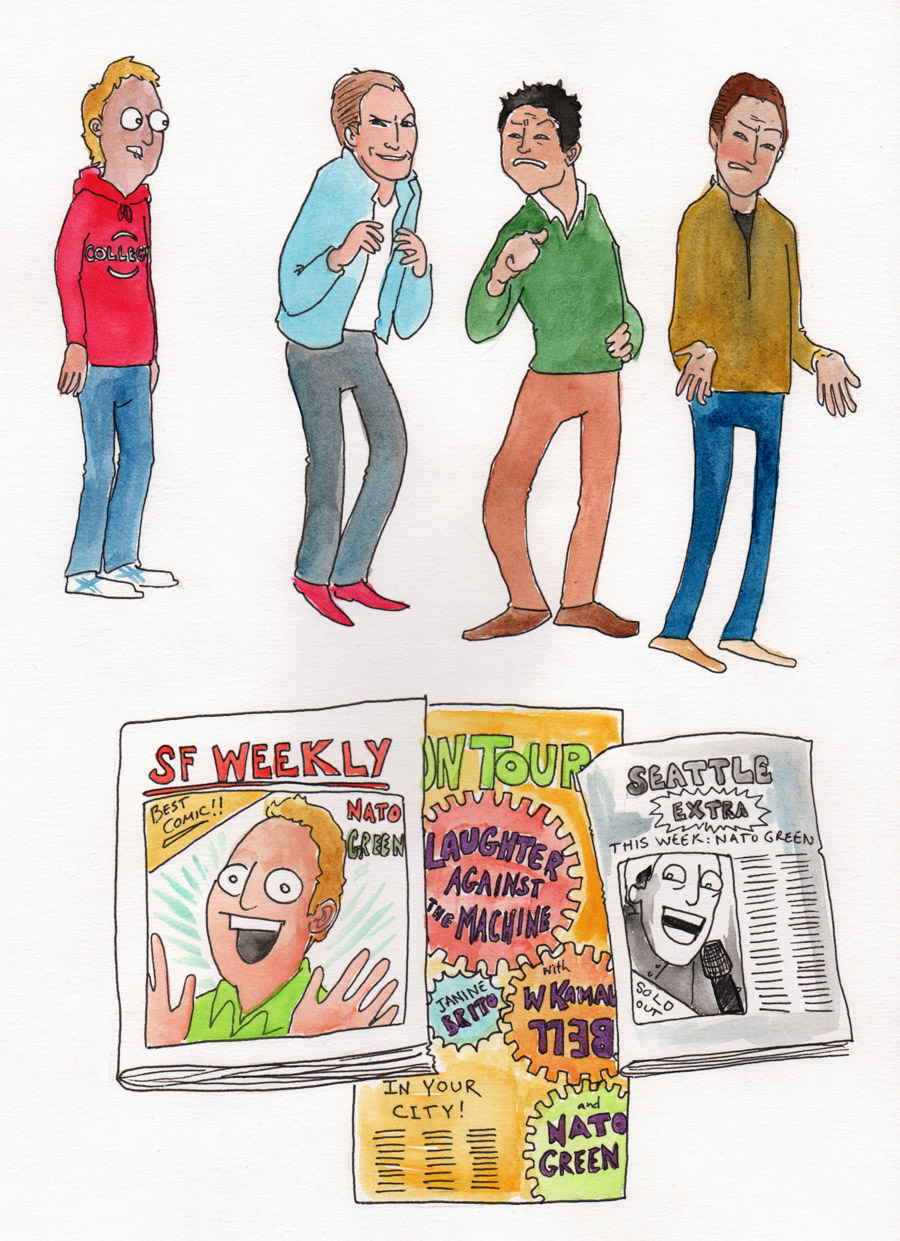
Nato: I had another career until a year and a half ago. I was doing open mics, local showcases, travelling for comedy when I could, until I reached a point in my comedy career where I felt like I had to choose. There were a bunch of things that happened at the same time. In the spring of 2010 I had a big show for Sketchfest…I got named Best Comic by SF Weekly…we did the first Laughter Against The Machine tour out of the Bay. Five shows in Portland and Seattle…I came back from that feeling like, “I’m on to something, I’m gathering momentum.”
When I started going to open mics seven years ago, I didn’t start going to open mics because I figured that would be the start of my career as a comic. I went to open mics to get it out of my system. Then I got the bug.
Over the summer of 2010, my wife and I decided that she supported me to pursue comedy for real. Partly because we thought that I have a particular set of skills and resources that might make it more feasible for me to make a living at it. Partly because she felt like if I didn’t try to do this at some point in my life, it was going to haunt me forever. She said, “I don’t want to have to live with that so let’s give it a try. Take your best shot.”
We have children so neither of us were interested in me being on the road 300 nights a year and perpetually making $20,000 a year. Can I figure out a way to do it so that it supports my family but is also creatively satisfying for me? We also reached the point where we agreed we were willing to lower our standard of living and move to NY or LA, at least temporarily, so that I could do it. That was the other hurdle.
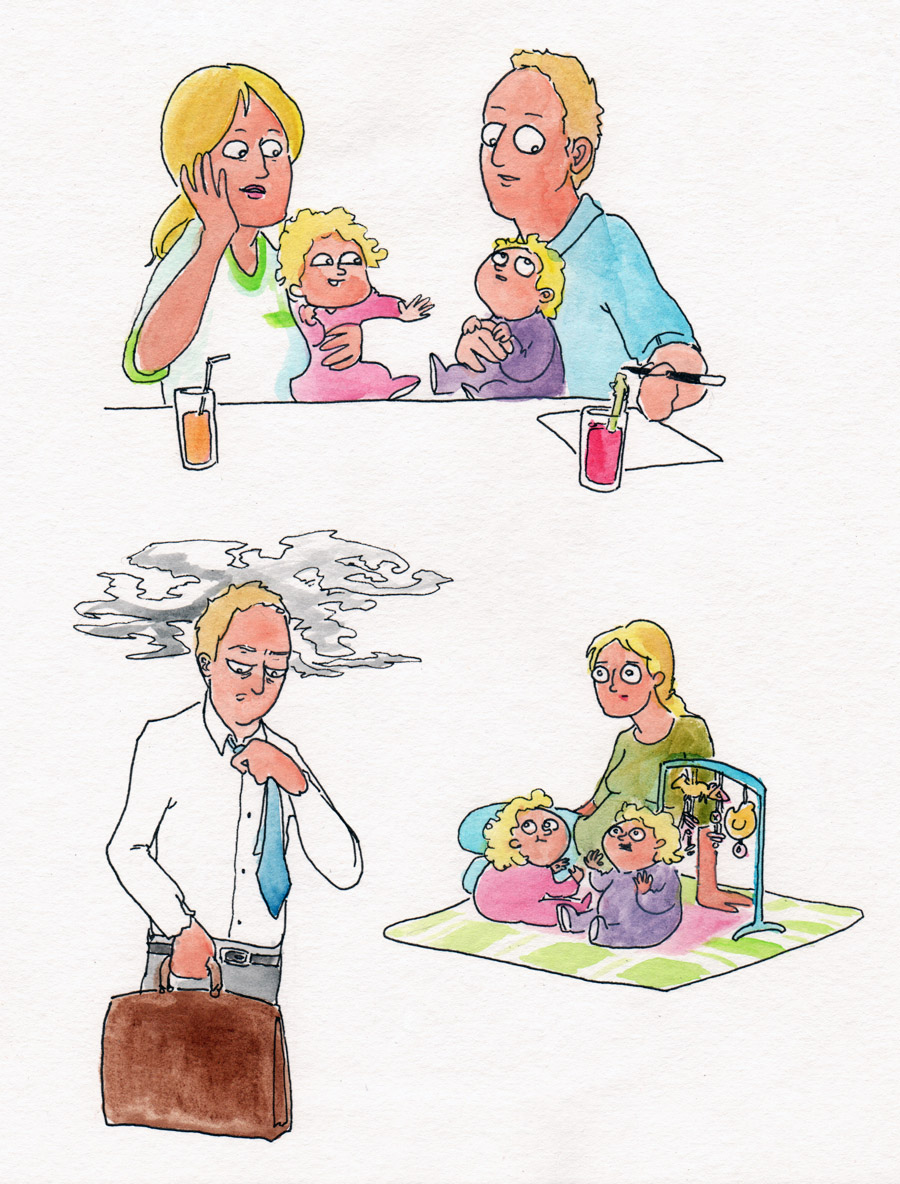
Nato: That was over a vacation. We were visiting my parents in Cape Cod that summer. I came home from that trip and, I was working a union, I was at the California Nurses’ Association at the time…there were local elections in San Francisco and the governor’s election…I went full board back into working on the elections. I loved and I’m proud of my career as a union organizer. I don’t regret the things that I did. I love the labor movement, but I had lost perspective about it. It was making me a worse parent.
Sassquach: How was it making you a worse parent?
Nato: To answer this question, we have to go back to the late 19th century. The AFL/CIO, for most of its history since World War II, internally practiced a one party democracy and became an ossified institution. When I was in college in ’95 there was the first contested election for president of the AFL/CIO and John Sweeney was elected president. When I got out of college in ’97, there was a feeling that the labor movement was changing…that it was getting involved in more community struggles and taking on bigger social justice stuff and trying to wake the dinosaur from its slumber. It was a very exciting time and lots of people from my generation who were getting radicalized as campus activists around ethnic studies and multiculturalism, Central American solidarity and fighting Apartheid in South Africa and anti-sweatshop work, so on and so forth, became drawn into the labor movement. All that is to say that I got into the labor movement not because I wanted to win any particular group of workers $.25 more an hour, but because I was interested in building a social movement to change the world and playing a part in that.
For a long time, for most of my career, I was able to maintain some sense of perspective about the idea that building a movement is not about winning or losing a particular campaign. It’s not about what’s right in front of you, it’s about how the process of participation affects people. The question I was always asking myself was, “How do we fight the fight in front of us so that, win or lose, we’re stronger for it?” Get more people involved, more people committed, more people who understand the politics of the issues. More workers ready to fight.
I’m generally an even tempered person, but I was able to be even tempered in my work that way, even thought I’d work really hard a lot. In the thick of a campaign you’re working 14-15 hours a day…but I always kept an eye on this long-term vision that went beyond the immediate question. I was losing sight of that. I was away from my kids. I wasn’t able to compartmentalize the work. I was personalizing everything. I was mad all the time.
Sassquach: Is that a common sentiment in the labor movement? Win or lose, we can still gain?
Nato: I’m fairly unusual in that regard.
For example…I’ve been thinking about this recently because there’s this furious debate on the left side of the labor movement about the recall campaign in Wisconsin. In February of last year there was this incredible outpouring of grassroots militance on the occupation of the Capitol. There were 100,000 people in the Capitol. It was an amazing moment and then at some point it got funneled into, essentially, a narrow elective strategy: recalling the incumbents and electing more Democrats. There’s been a big debate about whether that’s a mistake. That depends on what people learned from the experience.
The bad outcome is if the 100,000 people who occupied the Capitol and risked arrest to protest this right wing assault on the working people in the state of Wisconsin look at the recall and say, “It wasn’t worth it, we shouldn’t have done what we did.” That’s bad.
If the lesson people learned was, “We need to learn to walk and chew gum. We can’t only engage a recall strategy at the expense of other kinds of movement building and other kinds of militant direct action.” Or, “We can’t only focus on Madison and Milwaukee and neglect the smaller counties in the state.” Those are good lessons to learn and if someone learned them, that’ll be worth it. It’s all about the next fight, the next fight, the next fight. Frequently you’ll lose the fight right in front of you due to actions out of your control.
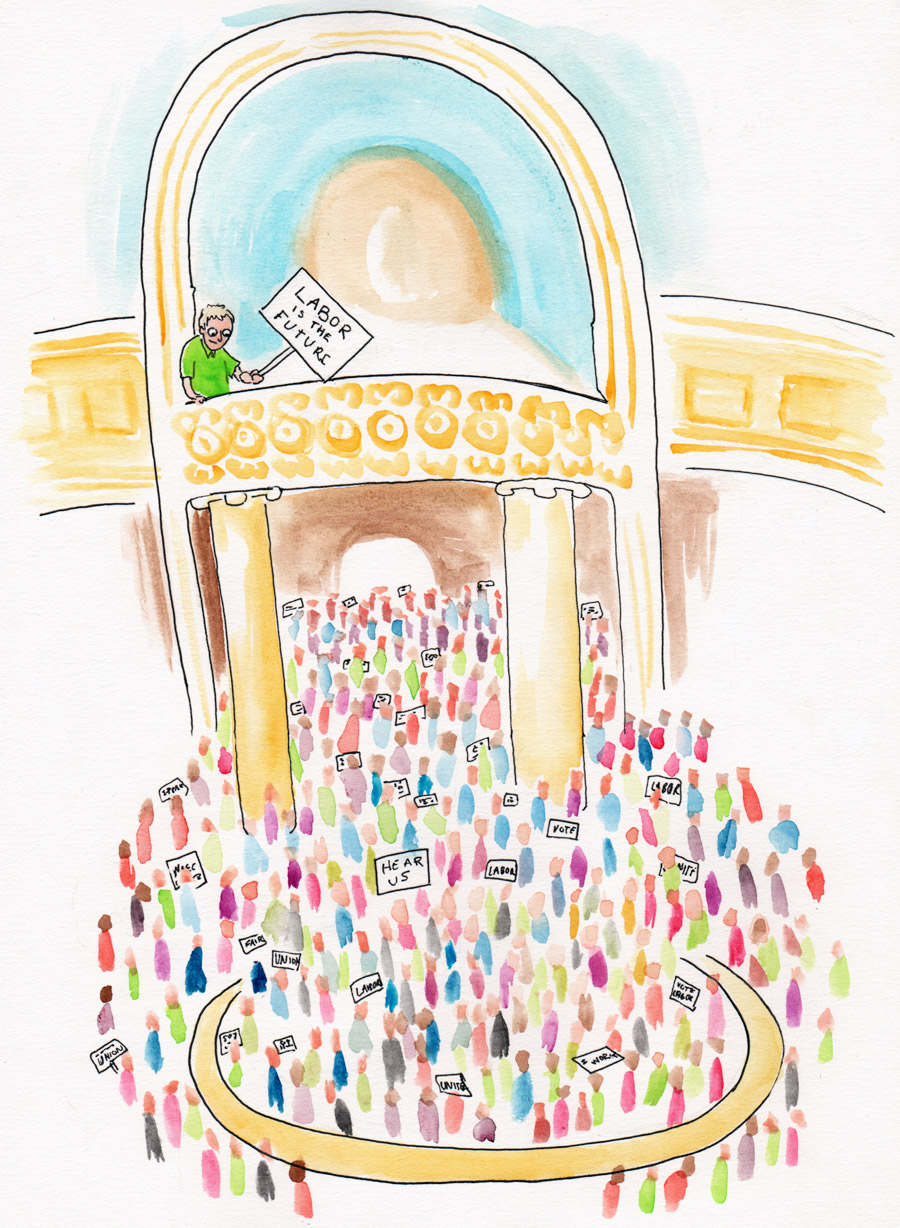
Nato: I did great work…my proudest professional accomplishment to date was when my union went to war with Sutter Health, which was trying to close a hospital that almost exclusively treats poor people in the neighborhood I grew up in. That hospital was supposed to be closed three years ago and I was part of the campaign that is the reason it is still open today. I’m very proud. Every night that I’m in San Francisco, I can look out my window and there’s a hospital in my neighborhood where I’ve lived my whole life. St. Luke’s hospital takes care of uninsured, Medi-Cal and Medicaid patients. That hospital would’ve been closed but for the collective effort I participated in.
Sassquach: Can you tell me more about how you did that?
Nato: Obamacare hasn’t changed the fact that we have a market based healthcare system. It’s not going to surprise anybody that poor people aren’t profitable. Because the public sector has been so decimated, the public sector hasn’t got the capacity to act as safety nets, you have hospitals like Sutter Health, which is officially not for profit…it manages to be legally not for profit but still be the most profitable hospital in the state. If you ask them directly, they’re cute about it and they say, “Oh it’s not for profit because our profits aren’t distributed to the shareholders as dividends,” but it is income in excess of costs…the money behaves like profit. Its business model is to acquire monopoly markets in Northern California, make themselves indispensable to insurance companies, and then raise everyone’s healthcare costs by acquiring every hospital they can get their hands on, cannibalizing it of its profitable services and then bailing on anything that’s unprofitable, which basically means taking care of poor people.
So they have this record of going around Northern California and acquiring and closing safety net hospitals or safety net services within multi-purpose hospitals.
They acquired St. Luke’s hospital at some point and began a plan of systematically shifting the services provided by private insurers to other Sutter locations and undermining the hospital for many years. That was why they wanted to close it. With private for-profit or non-profit hospital systems, what we discovered with Sutter is that the way to stop the cuts is to stop the expansion. Because hospitals are one of the most heavily regulated industries that exists, that also means there are many points of entry for public scrutiny and accountability related to business conduct because there are agencies at every level of government that have to approve things.
We called it medical red-lining. What they were doing was (and they were doing this all over the Bay Area at the same time) trying to erode these safety net hospitals and then build luxury hospital complexes.
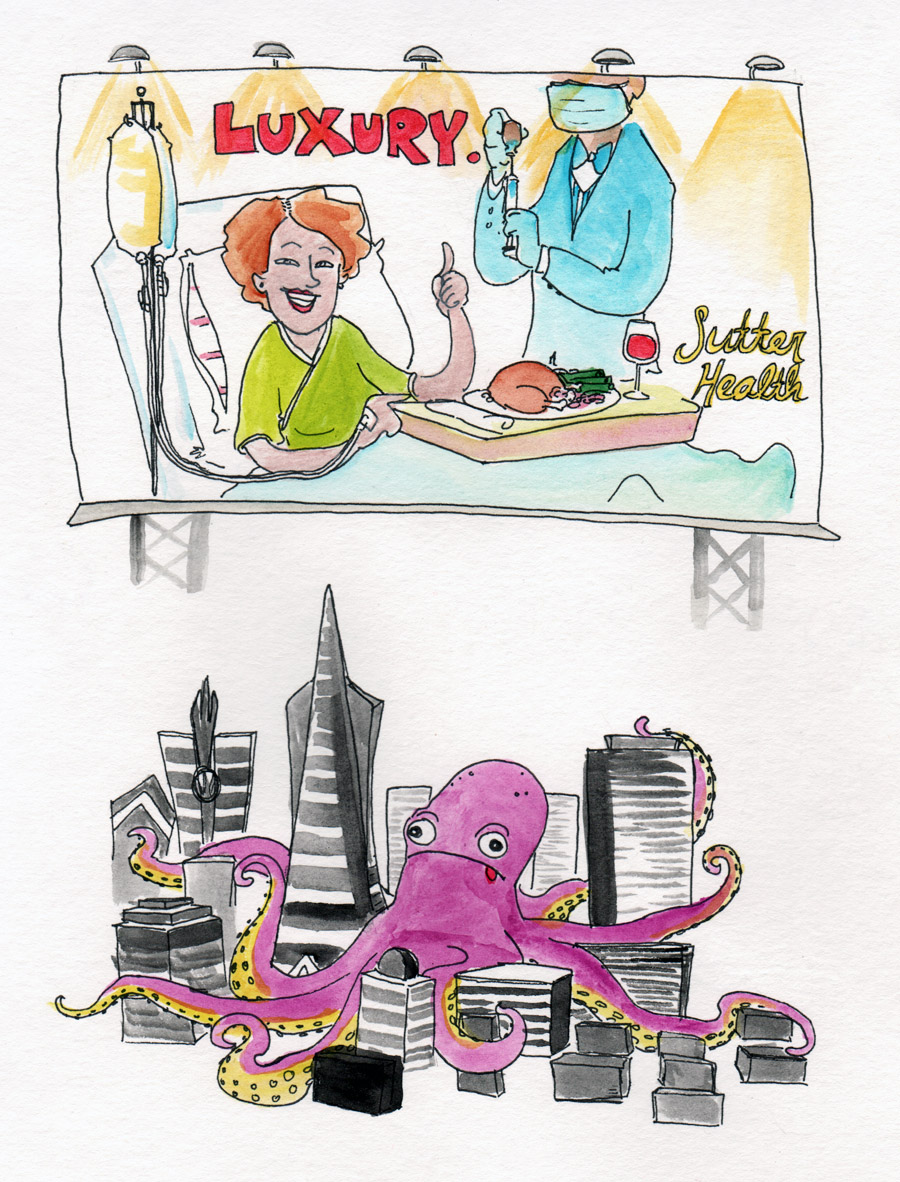
Nato: I thought of it as healthcare gentrification. They wanted to offer destination boutique healthcare with state of the art services and they aggressively adopted the creepiest customer service models from fancy department stores and hotels. They really marketed the hospitals with the thread-count of the sheets and the quality of the food. Because they were trying to build all these nice hospitals while they were trying to close all these important but unprofitable hospitals, but they needed permits from local governments to build anything. We were able to create a political reality in San Francisco with a broad coalition that their plans for San Francisco… I used to call it “The Octopus” because it involved this horrendously complicated policy knot that very few people understood that affected 5 or 6 different neighborhoods and affected healthcare and healthcare costs for everybody…it affected transportation, it affected housing, it affected neighborhood growth, it affected employment, it affected flight patterns of migratory birds…you name it.
The fact of the matter is that there have been cases where unions were accused of cynically exploiting the permitting process in order to leverage deals, particularly some of the construction unions have been accused of becoming deeply concerned in the fate of some endangered species (like, say, a turtle) until they get the deal they wanted. Then they forget about the turtles.
In this case, over the course of the years and pouring over thousands of pages of government records and studies and analyses, I became convinced that there was a legitimate argument that this was bad from an urban planning point of view, that it was bad from a healthcare point of view; not in terms of the needs of the company, but in that it was bad for the city as a whole and what kind of healthcare services the city needed and who needed them. Because [this hospital system] makes $180 million in profit in San Francisco a year, the city had a unique kind of leverage that they were never going to have with another real estate developer...no one is going to leave $180 million dollars on the table and walk away from millions and millions of prime real estate in San Francisco because they can't build the stuff that they wanted to build.
We are at the point where it’s clear that they’re not going to close St. Lukes, at least not anytime soon. They still don’t have the permits and it’s not clear what’s going to happen next.
Sassquach: What was your position within this campaign?
Nato: Because I worked for the union, part of my job was to work with the nurses who were employed by the project and help them get involved by making sure they were educated on the policy issues and that they educated me on the healthcare issues. They would tell me things in the way a nurse would say it and I would work with them on how to turn it into policy arguments that would affect people who make decisions.
At one point I was formally a lobbyist for the union in the San Francisco government. I was the person who had to testify at hearings and whatnot. I did work with a lot of other communities to try to build the community coalition so that it wasn’t just the nurses who were affected speaking out, but also those who were concerned about the patients and the neighbors.
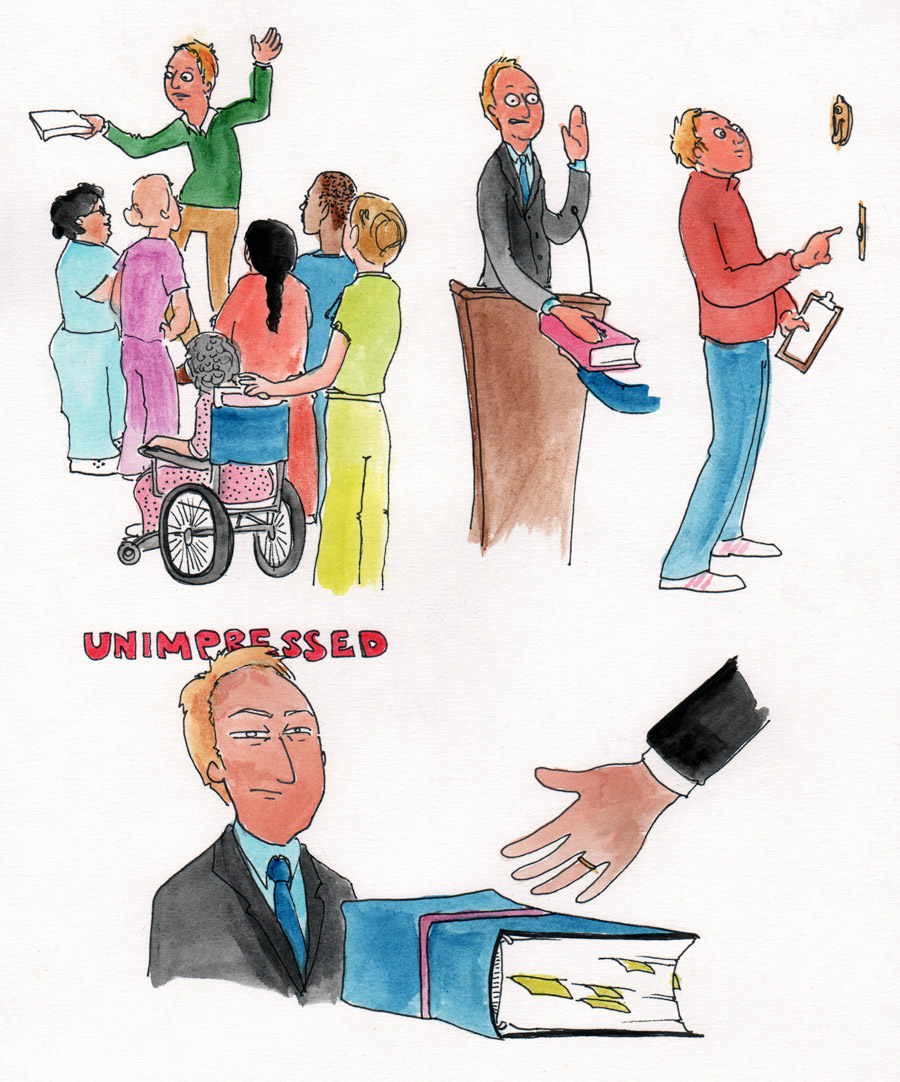
Sassquach: Which of those roles did you prefer?
Nato: I liked all of it. What I liked about it was thinking about something really complicated. It was like a puzzle. At one point I sent a thank you note to my college advisor. I was a history major and I had this advisor who I’m still in touch with. When I was in college she wrote on one of my papers that I was "occasionally eloquent". I went to Reed College and she said to me that the purpose of a Reed education was to get the intellectual tools to be able to make the best argument. "It doesn’t always matter if you make the best argument, but we want you to graduate from Reed feeling that, on any issue that you don’t know anything about, you can figure out how to evaluate evidence, go through data, analyze the text, break apart someone else’s arguments and construct your own."
I started this process where the hospital was facing closure and I went through these hearings where the operatives for the hospital would be coming out in suits with slide shows and footnotes, asserting all this stuff about healthcare, and my guts would be telling me it was bullshit. I am just middle class enough that someone in a suit doesn’t impress me. They would throw 500 pages of documents on the table and most people would be impressed because, “Oooh, it’s 500 pages of documents.” I’d take them and read them. I’d spread them out on my kitchen table with a bottle of bourbon and go through them until it made sense to me.
Sassquach: Did the bourbon help?
Nato: The bourbon helped. I’ve long been an advocate of using fingers as a unit of measure for beverages making a comeback.
What’s most interesting to me, probably the old school Marxist influence on me, is the theory in practice. The part I like the best is going through reams of documents and listening to massive amounts of testimony, evaluating the evidence and then figuring out with a group of people whose actual lives are going to be affected by it because it’s their job how to turn all of that information into a strategy and an organizing model that can make a difference. That process is the part I like the most.
Did you ever read “Ender’s Game”?
Sassquach: Yes.
Nato: The enemy’s gate is down. That’s the most basic political lesson. I always forget whether that’s Mazer Rackham or Sun Tzu: “The only teacher that matters is your enemy.” Those are the most fundamental lessons about strategy. (And how to think about strategy.)
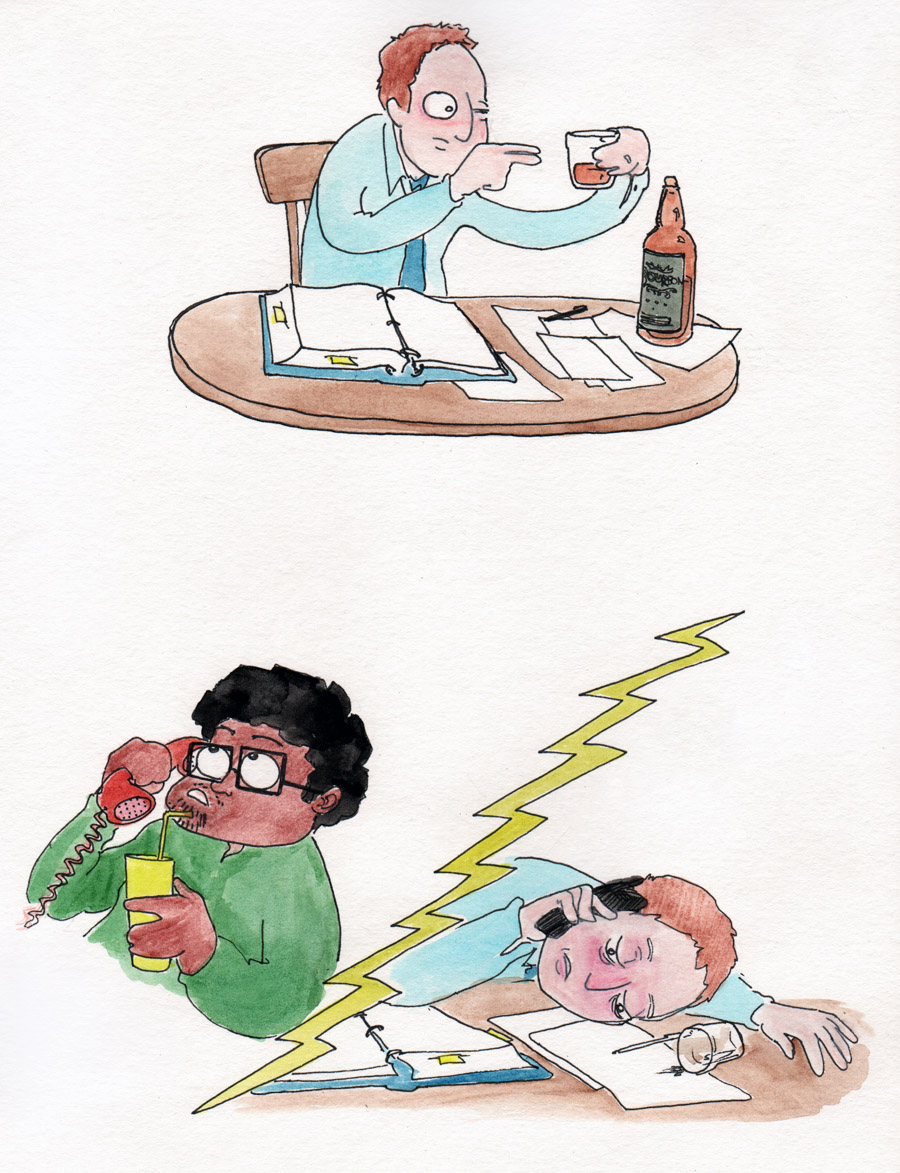
Sassquach: Will these practices carry over into your work on the television show?
Nato: To some extent, my role on the show is going to be what I’ve always done for Kamau, which is to help him connect to the news. “Nato, explain to me the healthcare measures in this ruling.” “What’s the difference between the state comptroller and the treasurer?” Things like that. We’ll see. I spent 14 years as an activist and I’ve trained my mind to work in a certain way. It’s not something I can turn off.
The basic kind of analysis that I apply to political strategy in some ways is similar to the way I approach my comedy. Who benefits? Who suffers? Who has power over the situation and how are they using it? What is causing this to happen? One of my favorite revolutionaries is Amílcar Cabral from Guinea Bissau, he led the revolution in Guinea Bissau against the Portuguese in the ‘50s…and said “Tell no lies. Expose lies whenever they are told. Mask no difficulties, mistakes, failures. Claim no easy victories.” He was talking about how to win a revolution, but I feel like the greatest comics of our time…that level of rigor and honesty about the conditions we face…that sounds like the comedy of Marc Maron to me.
I don’t know how to be a comic apart from thinking about things in that manner.
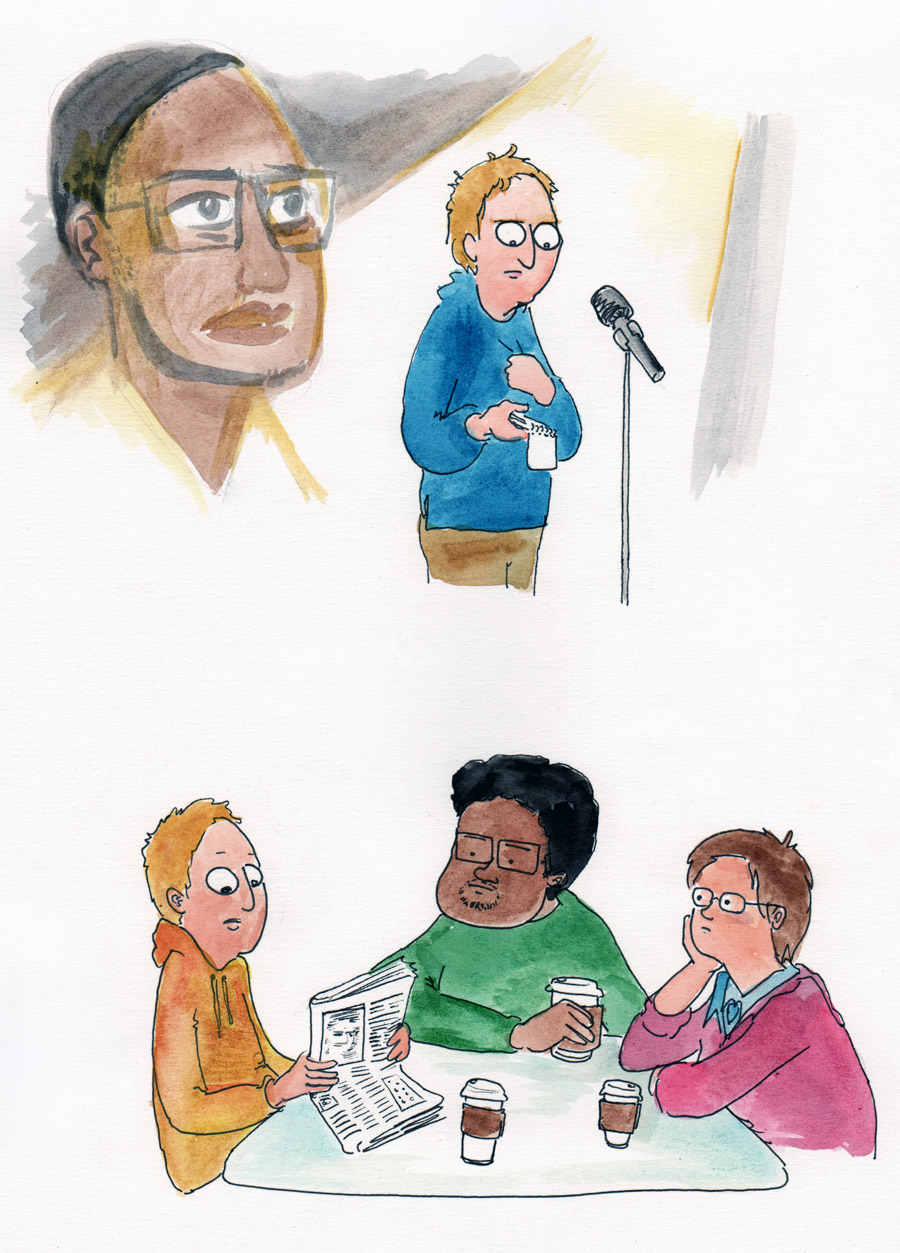
Sassquach: Let’s talk about transparency. You do bring yourself up in the album, but not tons. Is that a big challenge for you?
Nato: There are things about my personal life that I will get to at some point, but I am sort of waiting for more of my family to die. I don’t spent a huge amount of my act being self-deprecating or revealing unflattering things about myself, but I also only talk about things that I really care about and truly feel.
When we were on tour as Laughter Against The Machine, people always wanted to describe us as political comics because we talked about politics. Amongst ourselves…at some point, Kamau and Janine and I started calling it The New Sincerity. It’s going to sound corny, but comedians are known for using humor to protect their hearts. We want to use comedy to open our hearts.
We’re never going to do a joke and follow it by saying, “Ehh, we’re just kidding, these are just jokes.” I’m not the guy who’s going to make a dick joke. I’m not the guy who’s going to make jokes about stupid movies or television. I talk about politics the way that I do because it’s all been informed by my firsthand experience, having participated in that world.
That’s the way that I try to embody some of that honesty and vulnerability that Maron and Maria Bamford and Louis CK are known for having. There may come a time when a new set of things will come up. I have no idea what the next hour will be, but that’s been the guiding point, to be completely myself onstage and be very real about who I am and what I think about things.
Sassquach: How long did it take to assemble this hour?
Nato: I had a bunch of regular material that was part of my normal set as my A material, but because I was doing the show locally, I wanted to have enough new material for my local fans to feel like they were getting a good show and not just helping someone somewhere become exposed to my material. I started talking to Rooftop in February and taped it in May. From the first week of February to May, I created an aggressive workout schedule of shows, taping the sets, transcribing the bits.
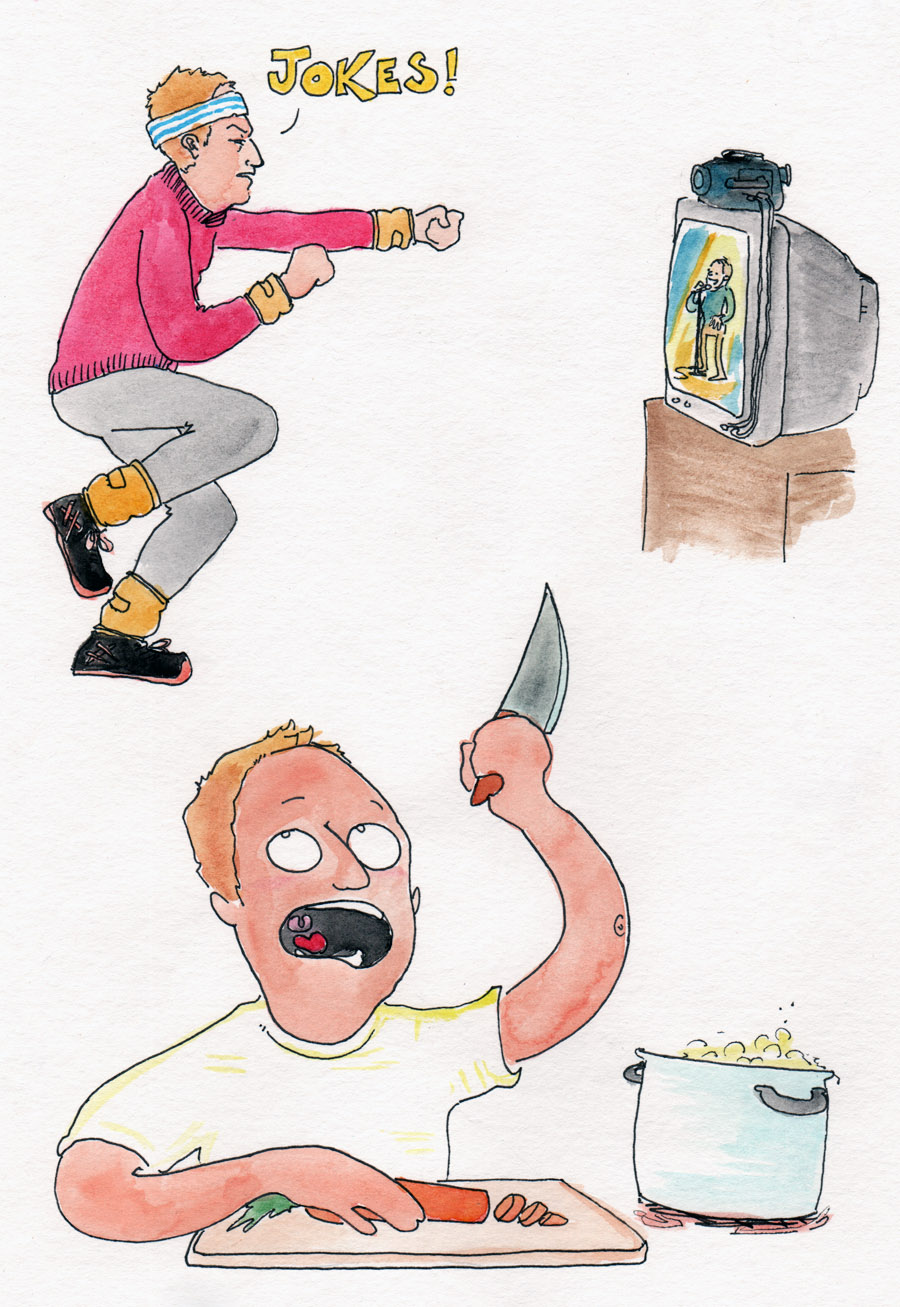
Nato: I rehearsed a bit at home for the first time…by myself.
I looked through notebooks at old bits, finding things that had never worked, seeing if I could find a way to make them work. Kamau and I did a comedy residency at the Hemlock for a few weeks to get ready. At the time, we knew the FX show was coming although it wasn’t public yet.
Back in the day in the 50s and 60s, people used to have these residencies. Mort Sahl had a residency at the Hungry i…he was there every weekend for months and months and months. Phyllis Diller had a residency at the Purple Onion. You would be the house comic at a place for an extended length of time. I don’t know what the geographic reach of that model was or when it stopped, but that was how people did it.
We wanted to have a show where we could get ready for touring and TV, recording the TV show, that would be easy for us to produce. At the same time we also had this Laughter Against the Machine documentary being edited and I didn’t know exactly which parts of my standup routine were going to end up in the documentary…I didn’t want it to be exactly the same material either. So there’s some material I really like that’s on the documentary that’s not on the CD. I hope it doesn’t end up on the editing room floor or I’ll be mad that I didn’t put it on the CD.
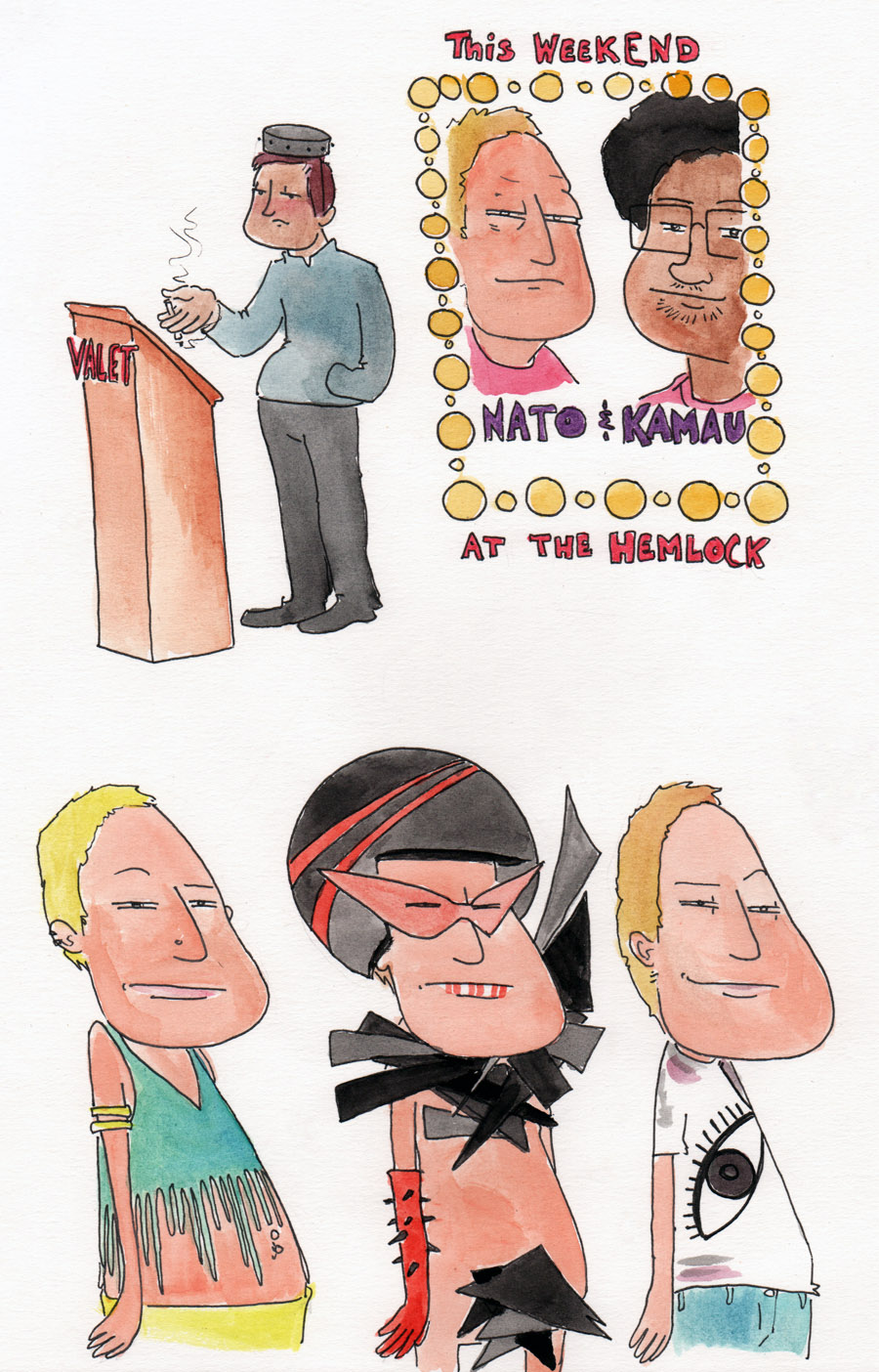
Nato: That was the process. I told Rooftop, “We’re not trying to market Christina Aguilera or Lady Gaga. We’re trying to market the Dead Kennedys. Let’s go see if there’s an audience for this.”
And it’s not a comedy audience usually.
I had some general ideas in mind. I decided I didn’t want to be particularly dirty. I am capable of being dirty, I have some dirtier bits, some of which I like. That’s material that I use in the club when I need a grenade to get the audience going. But I’m trying to build my audience and it didn’t feel like it fit. There are a million opportunities in showbiz to make yourself accessible. This is not the moment for that.
Sassquach: What are the responses you’ve been getting about the album?
Nato: Most people have been delightful about it, but when you put out a comedy album, the first place it goes is the comedy world. You have to figure out how to get it to the non-comedy audience. What tends to happen with comedy…like all other art forms, comedy has genres and styles. People have their preferences…yet, they don’t realize they have preferences. No one would say, “Let’s go to the movies.” “What do you want to see?” “Whatever’s playing. Let’s just go in.” You accept that you don’t like romantic comedies or westerns or whatever. No one judges you for that.
People will go to a comedy show or listen to a comedy album and they might think, “This is not good,” rather than, “This is not for me.” My album went out into the comedy blog-o-sphere and some of the critics said, “I like political comedy. This is about facing hard truths. It’s smart, it’s passionate. It thinks about changing the world. Therefore, I like this album.” Other people said, “This is not what I wanted.” We knew that was going to happen.
I’m talking about ideas. We’re going to do some thinking. It’s not going to be pure escapist entertainment. There are some people, like Chris Rock and Dave Chappelle, who are amazing at tricking the audience into being smarter than they want to be. They sneak the ideas into accessible acts. I’m not very good at that. Yet.

Sassquach: How’s the show going?
Nato: We just started writing [a few weeks ago], working on some of the sketches and segments that might end up on the show.
It feels very strange. I’m learning a lot at this point. I’m mostly working to understand how to transfer my approach to stand-up to television writing. The monologues will all be topical humor items that we’ll write closer to the air date. We’re generating material, thinking about interstitial pieces, less time-sensitive segments, interviews or guests we could have on the show.
Chuck Sklar is the head writer. There are a couple of veteran TV writers and then a bunch of people who have never had a job in show business before. I think we’re all still figuring out how to be a fighting force. It’s been really helpful to have people who know how to write television. It’s working the part of the muscles I built organizing, taking things apart and seeing how they’re done.
I’m still nervous, but it’s partly because it’s my first week at a new job. I hope people like me. Where’s the bathroom? I think I’m looking forward to the under-the-gun time sensitive writing, responding to the news of the week.
There’s still going to be a multimedia aspect, Kamau standing in front of a screen, with that powerpoint component. Really, what’s going to define it is Kamau’s comedic sensibility. Having worked with Kamau and toured with him…we started doing shows together 6 years ago and then there was Laughter Against the Machine 4 years ago…Kamau doesn’t want to talk about things he doesn’t care about. It’s not enough for it to just be funny. He’s past the point where he just wants to pan for jokes. He’s got to have some personal stake.
He also never wants to do jokes where the audience comes away not knowing what side he’s on. There’s no interest in saying, “Oh we make fun of all sides here.” No, Kamau has a world view and an ideology and we have friends in the Bay Area that we have to come home to who are going to give us hell if we go off the rails politically. He has his mom who will pull his sleeve if he does something stupid.
His act presents him as someone who is angry about racism…which he is and rightfully so…but it presents him as someone who has optimism. His show is called Ending Racism in About an Hour, not Wallowing in Racism for About an Hour. On some level, Kamau believes that if we could all get our heads straight, it’s possible to end racism in an hour.
I believe it’s possible to end racism, but not without also ending sexism and capitalism and homophobia and everything else. I don’t think it’s melodramatic to say that survival of the species depends on it. I am counting on human resourcefulness and ingenuity and our will to survive as a species to enable us to rise to the occasion of the massive challenges that history has lain before us.
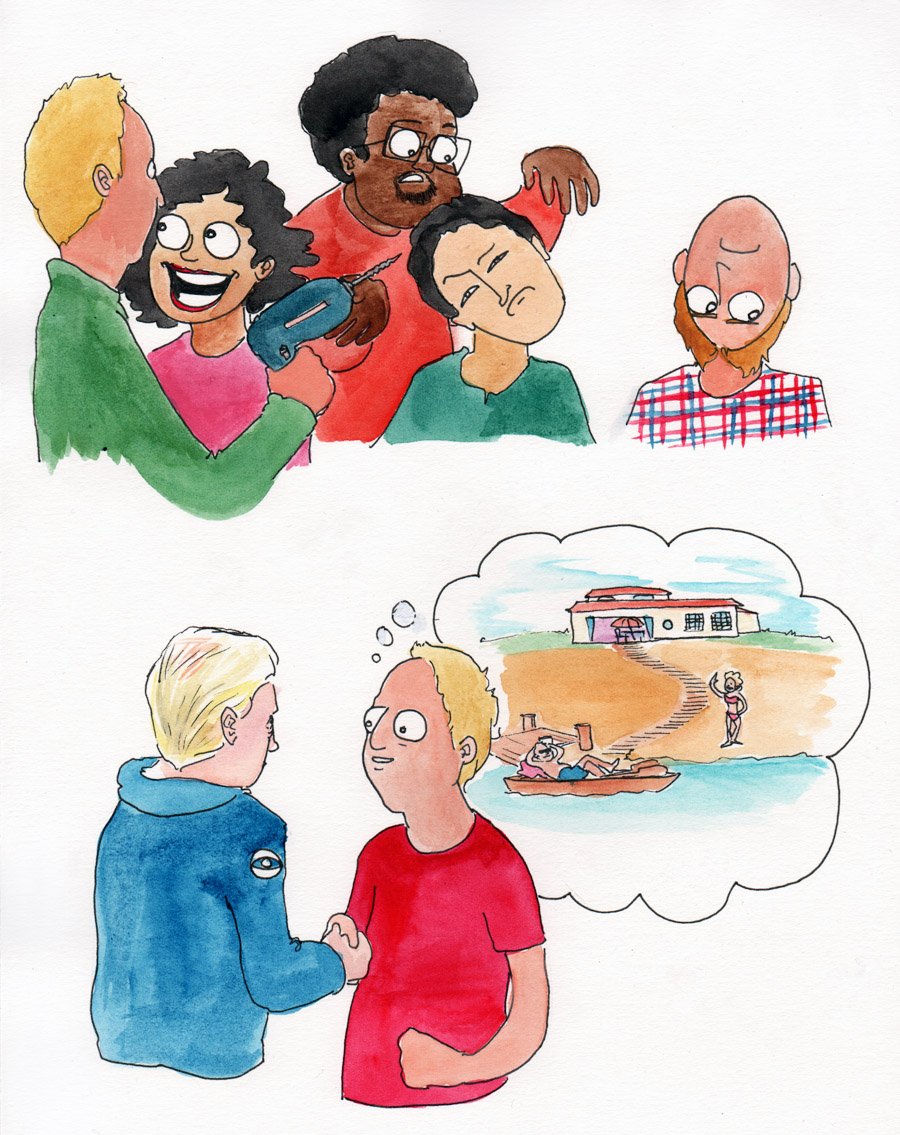
Sassquach: Do you have any further ambitions for television/film?
Nato: Sure. Of course. My friend Moshe Kasher said to me once that the key to show business was not being determined to succeed but being undeterred by failure. I was not in comedy for very long before the first time I auditioned for Letterman with Eddie Brill. I had a show in the Makeout Room in the Mission and out of the blue the casting director for CBS showed up. I started having these close calls early enough and a couple of times I had picked out my vacation house in Spain before I realized that nothing was happening. I’ve gone through that cycle of fantasizing about all the things that were going to happen…now, it’s about how to blow up the opportunity that’s right in front of me.
Blow up in a good way.
I feel like what we did in the Laughter Against the Machine documentary could lend itself to an episodic format as well. Kind of a combination of Democracy Now and Dave Attell’s Insomniac. Comedians go to a place and learn about the politics firsthand as part of the tour. I’ve been doing this show Iron Comic for many years, co-hosted it with Moshe Kasher. Moshe and I would like to develop that into a TV show. I think I might have a few scripts in me, a few books.
Sassquach: News network co-host?
Nato: I have a high risk of biting the hand that feeds me. The first day CNN calls, I’d be like, “Not until you fire John Stossel, ‘cause f*ck that guy.”
There has been some interest, but so far it’s been in radio. However, things started changing immediately once I came to New York. Now that I’m here and doing what I do, I’m constantly running into people who are like, “Oh I know the producer of that show, I’ll introduce you, they should know you.” I’m open to it.
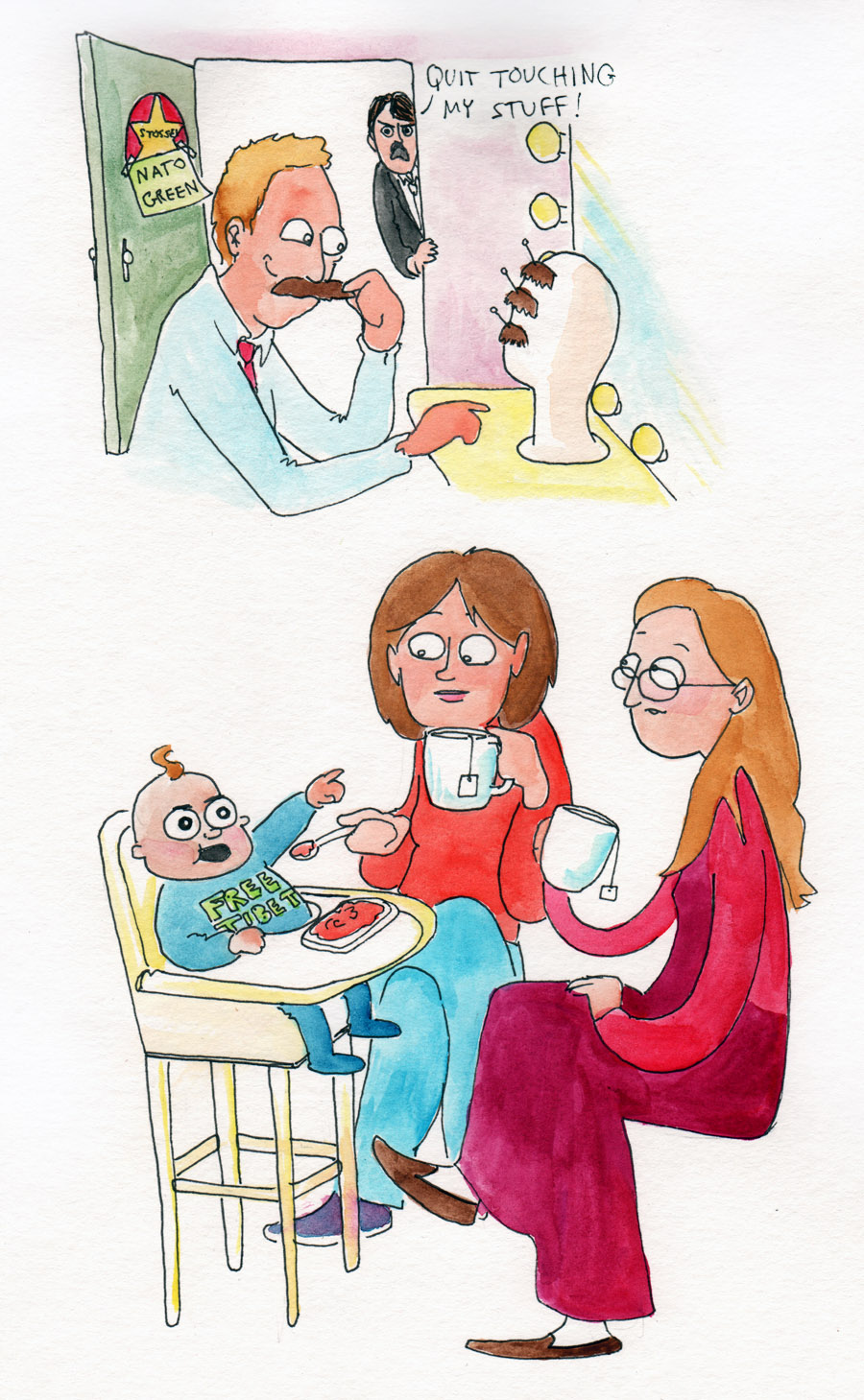
Sassquach: Did your political inclinations came from childhood or college years?
Nato: I was born into it. My parents were activists when I was little. I grew up going to peace marches and Ban the Bomb marches and Central American solidarity marches and gay pride marches. I went on strike with my dad with the teacher’s union when I was 3 or 4. As I got older, comedy and music (like hip-hop and punk rock) played big in the development of my politics.
My parents moved to San Francisco for the summer of love. They were part of the New Left of the 70s. They had reverence for Marxism and the Civil rights movement, but they were also teachers. The major thing that they instilled in me was, “Trust your own mind. Have the arguments. Never fear the truth. Ask questions.” The stories that they tell…as soon as I could walk and talk, I would hold court from my high chair discussing big ideas with people. It led to politics, but the big idea was a strong, if not delusional and narcissistic faith in my own judgment.
Which is not to say that I think I’m right all the time. I don’t think I’m right all the time, I just trust my own judgment. I’ve regretted every time in my life when I deferred to someone else’s judgment over my own.
Sassquach: How did you meet Kamau?
Nato: When I started comedy, Kamau was already jaded and cynical. We had a mutual friend from outside the world of comedy who, when I started, said, “Oh, you should meet my friend Kamau.”
Kamau responded in the way that I now recognize as the response of more experienced comics to new comics showing up…which is sort of, “Talk to me when you’ve been around for four years.” New comics come and go and give up so quickly that you almost don’t want to expend the energy to remember people’s names until they’re over the hump.
When I met Kamau in 2005, around the time I got started, that was before he started the Bell Curve. It was right before he got Montreal and Premium Blend and (he’s the first to admit) it was not a good time in his career. He had bottomed out. Now he’s in this weird generation of comics from San Francisco…[they got to working just as] the comedy bubble burst. The boom of the ‘80s ended between '92 and '94 when Greg Behrendt and Marc Marcon and Patton Oswalt and Brian Posehn all moved to LA…and then later on this new generation of Brent Weinbach, Louis Katz and Moshe Kasher shows up. They have websites and mailing lists and myspace pages…they were producing their own shows…they’d figured something out about branding themselves. Kamau was of this generation that was stuck in the middle. They thought you just had to do well at the Punchline and then Hollywood would come and get you.
It was a pretty hard lesson. That wasn’t going to happen anymore.

Nato: So he started The Bell Curve. There was a boom in political comedy during the Bush years and from my point of view, a lot of it was lazy. It’s similar to what you see now with people who make fun of the Tea Party and Sarah Palin. It’s not hard to make fun of people who are stupid or inarticulate. I felt like it was politically unsound. If you extrapolated from the comedy you were seeing, what it meant…the implication is that Bush’s policies were bad because he was stupid. That’s clearly not the case. Bush’s policies were bad because of his ideologies and because of what he represented, not because he was inarticulate.
When Obama was elected, a lot of people walked away from political comedy shows. [Kamau and I] had a conversation one night at the bar in the Makeout Room right after Obama was elected. We felt like America, we’re not done with you. Get back in our office.
A plumber’s gotta work even when there’s not broken pipes. We felt like America was still corrupt and decadent…that it was just a matter of time before we figured out what we were mad about with Obama…it wasn’t going to just be that he was inarticulate. We had been frustrated by the political comedy shows we had been doing because doing comedy shows that were marketed as liberal comedy shows drew this smug NPR audience that wanted to hear things they agreed with that they could clap at. We both wanted to be able to make fun of our own side.
We wanted to have a freer range, take on any big idea and not just the latest gaffe…we also wanted a more expansive ideal politically that included race and history and sexuality and things like that. We started doing Laughter Against the Machine and carefully marketed it in a different way to attract audiences who were on board for that. We succeeded to a degree, then we connected with Janine at some point. We didn’t set out to be the diversity tour. We set out to find comics that we shared a sensibility with, who approached comedy with the same set of values. It just happened that the three of us would be so diverse. When people see us together…we saw this when we were on tour walking around airports, people were just like, “WHAT IS HAPPENING HERE? HOW DID THIS COME TOGETHER?” If you’ve ever seen me and Kamau and Janine on stage together, one of the things that comes across is that we really like each other. We enjoy being together.
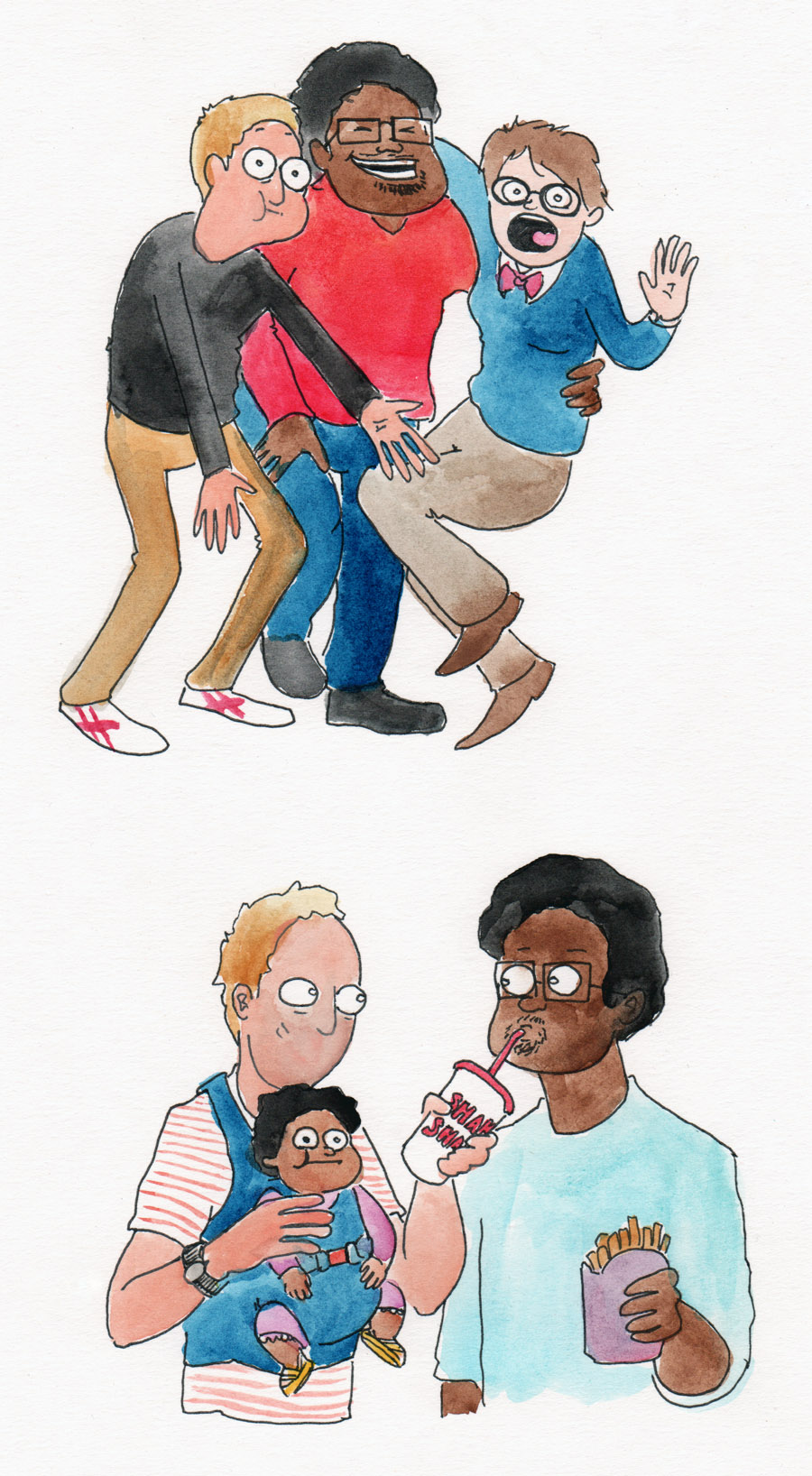
Nato: Just yesterday, Kamau’s wife was out and Kamau knows I miss my kids, so he’s invited me to hang out with his kid a lot. We were walking down the street and I was holding his kid and I held out my milkshake to him and he took a sip and said, “People are going to think we’re two gay dads." I said, "Well…two gay dads who have let themselves go…and don’t know how to put themselves together.” Ten minutes later a family passes by and this 13 year old girl says with a beautiful Caribbean accent, “Oh beautiful parents!” Kamau said, “I told you so.” ...Now his daughter is the same age as my nephew and our kids all do stuff together. It unfolded over time but we came out of it with this great working relationship.
Thanks for talking, Nato! Readers, don't forget to check out his album. Tune into Totally Biased on August 9th at 11pm!
Also, did you kids notice the new "Shopping" tab above? Click it and discover the glories of the new Sassquach book!
 comedy,
comedy,  interview,
interview,  labor union,
labor union,  nato green,
nato green,  television,
television,  totally biased,
totally biased,  w kamau bell
w kamau bell 

Reader Comments